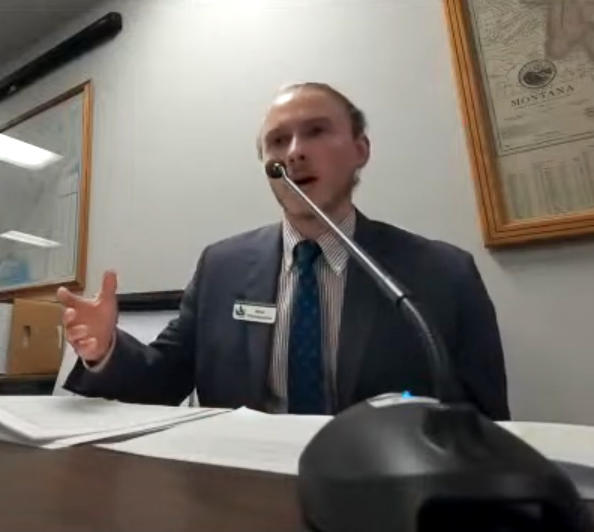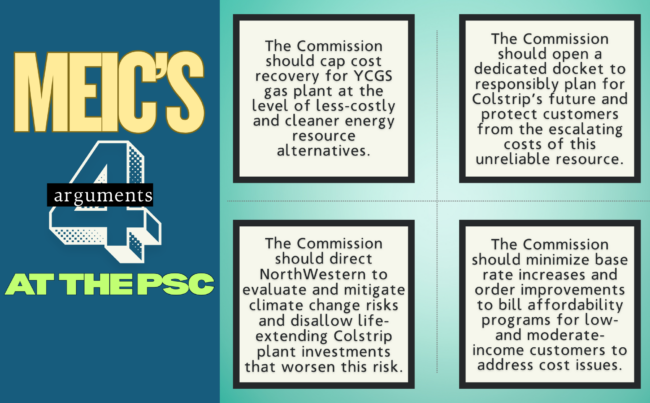
MEIC’s Nick Fitzmaurice testified as an expert at the rate case hearing, despite NorthWestern Energy’s efforts to prevent him from testifying. Screenshot from PSC livestream.
by Nick Fitzmaurice
NorthWestern Energy’s rate case is in its final months after an intensive eight-day hearing at the Public Service Commission (PSC) concluded on June 18. With post-hearing briefs from NorthWestern and intervening parties filed in July and August, the PSC will make a final decision this fall on whether, and by how much, NorthWestern can increase customers’ rates.
NorthWestern filed its rate increase application with the PSC in July 2024, kicking off a rate case proceeding after the PSC had already approved a 28% increase to electricity rates in October 2023. NorthWestern initially requested an outrageous 26% increase to residential electric customers’ base rates. After entering into a partial settlement agreement with several intervening parties (MEIC did not sign onto the settlement), the utility’s final request is still for a massive 20% increase to residential customer base rates. Base rates are tied to the utilities’ profits and are derived from capital investments into utility infrastructure. They make up about three-quarters of the total rate for electric service, with the remainder associated with variable costs that are passed directly to customers. If variable costs remain the same, a 20% base rate increase could mean as high as a 15% overall bill increase for Montana’s residential electric customers compared to rates from July 2024. MEIC jointly intervened in the rate case alongside NW Energy Coalition, Natural Resources Defense Council, and District XI Human Resource Council, represented by our attorneys at Earthjustice, as the voice for environmental, climate, and affordability considerations in these proceedings.
The “joint parties” presented our arguments and evidence through the testimony of six experts with extensive pre-hearing filings before questioning by NorthWestern, the PSC, and other intervening parties at the hearing itself. Our experts explained how NorthWestern overstated its need for new generation, then failed to properly evaluate cleaner, more affordable alternatives to the Yellowstone County Generating Station (YCGS – sometimes called Laurel Generating Station) and life-extending investments at the Colstrip plant. Our experts also laid out how NorthWestern hid the true impact to customers of this rate increase with unrealistic projections of market sales, as well as how NorthWestern’s proposed rates would unduly burden its customers, particularly low- and moderate-income households.
As one of our experts, I testified to NorthWestern and the PSC’s responsibilities under Montana’s Constitution to consider climate change in energy investments and the regulation thereof. I explained that NorthWestern faces tremendous risks from climate change, while its fossil fuel investments exacerbate these risks, and that the utility should not be rewarded with a higher return on equity as a result of its mismanagement in the face of these rising risks. NorthWestern fought for months to keep any mention of climate change out of the official record for these proceedings, but the PSC denied NorthWestern’s motion to disqualify my expert testimony, and had to do so again when NorthWestern renewed its motion against my testimony during the hearing itself.
Each day of the hearing opened with an opportunity for public comment, when people from across the state expressed their concerns for the unaffordability of this rate increase and the harm of NorthWestern’s fossil fuel investments. Unfortunately, a number of politicians and NorthWestern contractors also showed up to support the utility and the increase in rates.
So what’s at stake in this rate case? The most important issues for MEIC center around cost recovery for the YCGS gas plant, future treatment of the Colstrip coal plant, NorthWestern and the PSC’s consideration of climate change risks in infrastructure investments, and the affordability impacts of any rate increase. Specifically, we have advocated for the PSC to disallow substantial costs for YCGS (if cost recovery is allowed at all) related to cost overruns, facility units that have not come online, inflated annual operating projections, the lower cost of renewable energy alternatives, and the climate costs that NorthWestern has ignored.
MEIC highlighted how maintenance costs for the Colstrip plant are increasing drastically, while NorthWestern’s share of those costs will increase if it acquires extra shares of the plant at the end of the year. MEIC has also advocated for the rejection of NorthWestern’s proposed “Reliability Compliance Balancing Account” for future life extending investments at the plant, as well as for the disallowance of any current or future capital investments in the plant. We are advocating for the PSC to open a dedicated docket to address the myriad issues at the Colstrip plant, including increasing costs and risks associated with an aging plant, rising fuel costs, reliability issues, decommissioning timelines, community and workforce transition, and eventually replacing the plant’s power and grid services.
MEIC is contesting a number of issues that impact affordability, including advocating for a lower approved return on equity, pointing out that NorthWestern is pocketing certain revenues that should be flowing back to customers, and pushing back against NorthWestern’s proposal to shift costs from larger industrial customers to residential customers. MEIC is also encouraging NorthWestern and the PSC to utilize the Social Cost of Greenhouse Gases to assess the true costs of fossil fuel investments. Given the acute unaffordability of NorthWestern’s proposed rate increase, it is distasteful that the utility has gone to great lengths to obscure the true impact its proposals would have on customer bills. (Go to MEIC’s website for a more detailed breakdown of these issues in our July 17 blog post “NorthWestern Energy Rate Case Costs that Should Not Be Charged to Customers”)
We now await a final decision from the PSC, at which point MEIC will continue fighting to transition NorthWestern’s electric generation portfolio to affordable, carbon-free energy.

This article was published in the September 2025 issue of Down To Earth.

